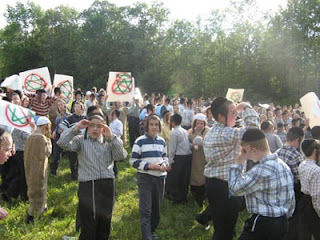Tuesday, November 6, 2007
Monday, November 5, 2007
Saturday, November 3, 2007
Free Talk Live Sunday 11-04-07 White Education 101 Part 2
Join me Sunday 11/04/2007 for "White Education 101" Part 2
Listen Live at 9pm est: Winamp
Winamp
Embedded Players:
Topics:
Jews in Congress - Let's explore how OVER represented Jews are in congress.
The White House Cabinet - If you think the numbers in congress are bad wait until you hear about Bush's cabinet!
Presidential Advisers for both Clinton and Bush - Guess what? MORE JEWS!!!
The Talmud - Learn all about this evil anti-White book of hate that the Jew reveres so much.
Racist Hoaxes Against Whites, NON WHITES BUSTED! - We will take
a look into how Jews, Blacks, and other non-Whites are blaming us for
their bad behavior by painting reversed swastikas and other such failed
tactics.
Music Starts at 8:00pm EST, White Education Starts at 9pm EST
Skype ID: vnnfreetalklive
Phone:


For those with plain old telephones we have a conventional phone number:


Thursday, November 1, 2007
New Study: There is a Holocaust Victim Born Every Minute
 Newest Generation of "Holocaust Victims"
Newest Generation of "Holocaust Victims"Looks like we know where the next crop of “Holocaust Victims” will be springing up from. I’m sure that Jews will soon find that this “trauma” will effect the next 20 generations of Jews just the same. The world will be full of “Holocaust Victims” 200 years from now no doubt.
Study: Holocaust trauma affects grandchildren of survivors
By Ofri Ilani, Haaretz Correspondent
More than 60 years after the Holocaust, the trauma of Nazi persecution is still affecting survivors' grandchildren, a recent study by a researcher from the University of Haifa suggests.
The study on the long-term effects of extreme war-related trauma on the second and the third generation of Holocaust survivors involved 88 middle-class families. According to the study, young men and women born in Israel 40 years after WWII suffer greater emotional difficulties than the general population. Advertisement
Dr. Miri Scharf found in her research - which was recently published in the scientific U.S. periodical Development and Psychopathology - that these emotional difficulties often manifest themselves when third-generation 18- and 17-year-olds enter the Israel Defense Forces.
Scharf, herself the daughter of Holocaust survivors, says she was attracted to the subject following her own experience. "My father had to live on the run, and moved time and again between 17 different hideouts," she told Haaretz. "My mother also roamed in different areas, trying to survive. Several of my family members perished in the Holocaust, and my father carried with him the terror of living in hiding."
According to Scharf, she became aware of the effects of living with third-generation emotional baggage from the Holocaust when she was working with students whose grandparents were survivors. "Some of them spoke of having a hard time trusting, of their fear of getting screwed over," she says. "This comes from a terrible air of suspiciousness at home."
In her research, Scharf strove to identify the differences in the functioning of adults whose parents had survived the Holocaust, compared with that of another group. Another objective was to characterize the psychosocial functioning of adolescent grandchildren.
Degree of presence of Holocaust in the family was examined in families in which both parents were survivors, in families where either mother or father was a survivor and families where neither parent was a survivor.
Mothers' Holocaust background was associated with higher levels of psychological distress, and adolescents in families where both parents were survivors perceived their mothers as less accepting and less encouraging of independence. The teenagers reported less positive self-perceptions than their counterparts.
"When only one parent is a survivor, the kids do fine, " Scharf noted. "The problems begin when their homes have too many dark shadows in them."
The results of the study, says Scharf, show that it is recommended for clinicians to develop awareness of the possible traces of trauma in the second and the third generation to better treat that section of the population.


